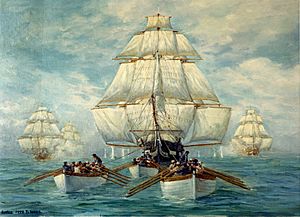Flotilla Service Act of 1814 facts for kids
 |
|
| Long title | An Act authorizing the appointment of certain officers for the flotilla service. |
|---|---|
| Enacted by | the 13th United States Congress |
| Effective | April 16, 1814 |
| Citations | |
| Public law | Pub.L. 13-59 |
| Statutes at Large | 3 Stat. 125, Chap. 59 |
| Codification | |
| Acts repealed | P.L. 13-62, 3 Stat. 217, Chap.62 |
| Legislative history | |
|
|
The Flotilla Service Act was an important law passed in the United States on April 16, 1814. This happened just before the British Royal Navy started blocking off the New England Colonies on April 25, 1814.
This law created a temporary naval group to help with water-based attacks and defenses. This group was formed in the Mid-Atlantic region, especially by the Chesapeake Colonies. Their main job was to protect the area during the War of 1812.
This special naval group, called the Chesapeake Bay Flotilla, used small boats. They moved through shallow waterways like tidal creeks. Their goal was to stop the British Royal Navy from moving further into the Chesapeake Bay and its smaller rivers. The Act also provided money for this service. This was a response to the expected attack by the British Army on Washington City (now Washington, D.C.) on August 24, 1814, which became known as the Burning of Washington.
Contents
What the Flotilla Service Act Did

The United States Congress, during its Thirteenth session, created this law (Public Law 13-59). It had three main parts. These parts helped organize the people needed for the naval forces. They also helped meet the military goals of the American forces.
Appointing Officers
The first part of the law, called Chapter LIX § 1, allowed for the appointment of officers for the flotilla service:
- Four captains
- Twelve lieutenants
- These officers would work in the flotilla service. They would not have a rank in the regular Navy. However, they would have the same power and importance within the flotilla service as officers of the same rank in the Navy.
Pay and Benefits
The second part, Chapter LIX § 2, explained how much these officers would be paid:
- Captains would receive the same pay and support as a Navy captain who commanded a ship with 20 to 32 guns.
- Lieutenants would get the same pay as officers of their rank in the regular U.S. Navy. They would also follow the same rules and regulations as the Navy.
Presidential Appointments
The third part, Chapter LIX § 3, gave the President special power:
- It allowed the President of the United States to appoint any of these officers even when the Senate was not meeting.
- However, these appointments had to be approved by the Senate at their next meeting.
End of the Flotilla Service
The Flotilla Service Act of 1814 was canceled on February 27, 1815. This happened just ten days after the Treaty of Ghent was officially approved. The Treaty of Ghent was the peace treaty that ended the War of 1812.

